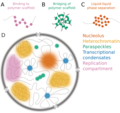File:Formation and examples of nuclear membraneless compartments.png

Size of this preview: 637 × 600 pixels. Other resolutions: 255 × 240 pixels | 510 × 480 pixels | 816 × 768 pixels | 1,088 × 1,024 pixels | 1,700 × 1,600 pixels.
Original file (1,700 × 1,600 pixels, file size: 1.34 MB, MIME type: image/png)
File history
Click on a date/time to view the file as it appeared at that time.
| Date/Time | Thumbnail | Dimensions | User | Comment | |
|---|---|---|---|---|---|
| current | 20:09, 4 May 2020 |  | 1,700 × 1,600 (1.34 MB) | Rob Hurt | Uploaded a work by Peng A and Stephanie C. Weber from https://doi.org/10.3390/ncrna5040050 with UploadWizard |
File usage
The following pages on the English Wikipedia use this file (pages on other projects are not listed):

